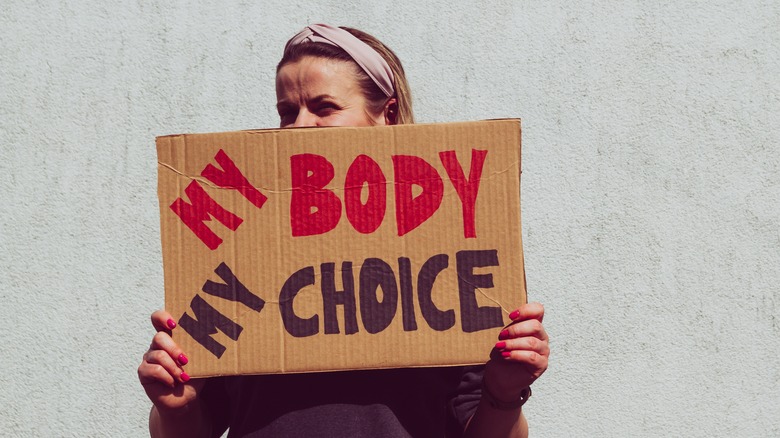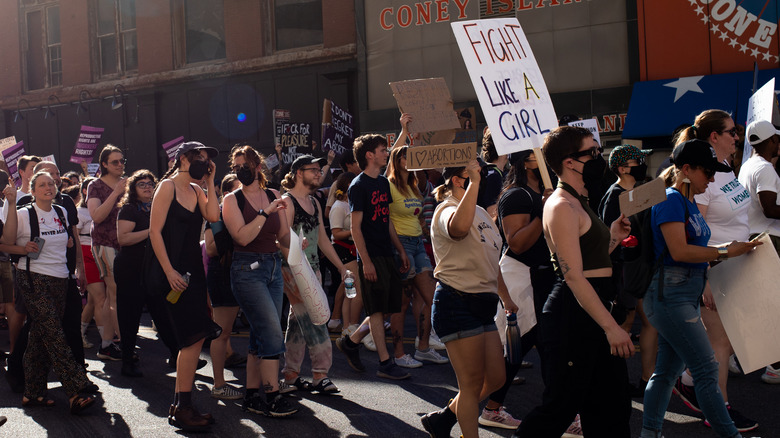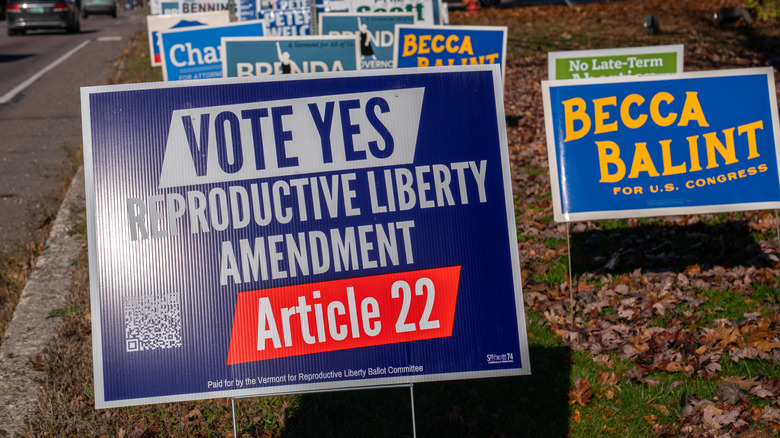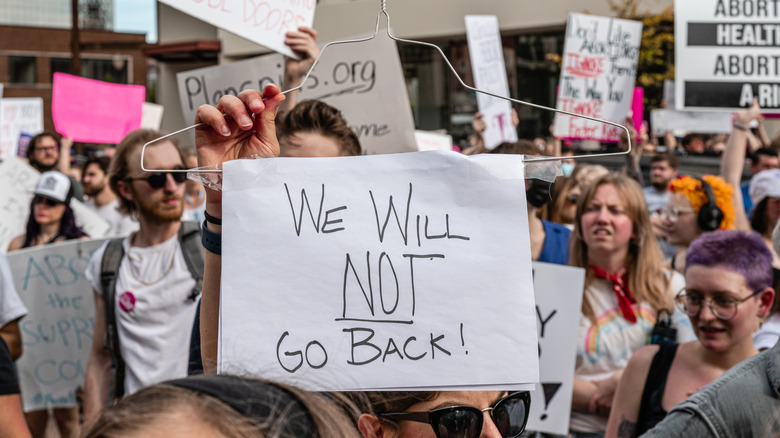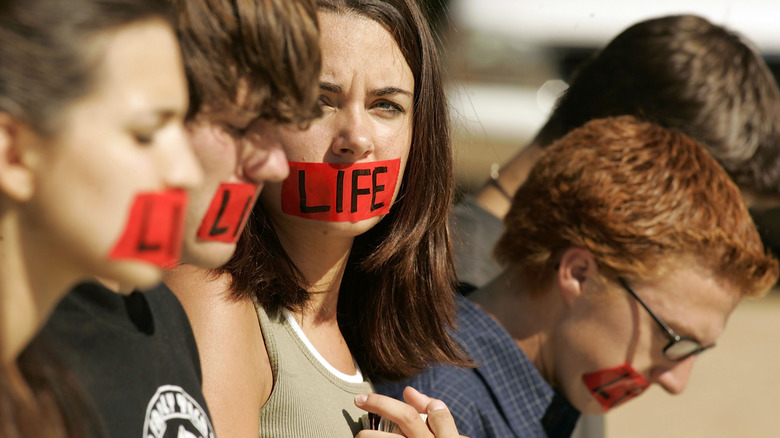Pro-Choice Won In These 5 States Where Abortion Was On The Ballot
Political analysts, polls, and advocates were saying the same thing for months: abortion was going to be what motivated people to vote in the 2022 midterm elections. In the wake of the Supreme Court's Dobbs v Jackson Health Organization decision back in June, any federal protections for abortion were repealed. The power to allow or ban abortions is now left in the hands of the states — a power that many have flexed without hesitation.
Within 60 days of the Dobbs decision overturning the protections of Roe v. Wade, the Brennan Center for Justice reports many states across the south and Midwest enacted abortion bans and restrictions. This includes Indiana, which became the first state to pass a ban on the procedure — though The Guardian reports the state's Supreme Court blocked the ban because "it violates the state constitution."
But the same can be said about states working to protect abortion rights. As of November 9, the Guttmacher Institute reports that 17 states and the District of Columbia currently protect the right to an abortion, with some states voting this week to add an amendment to protect abortions to their constitutions, per Ms. Magazine. This includes Kansas, which NPR reports voted down a state constitutional amendment banning abortion back in August.
As results from the elections on November 8 continue to roll in, one thing is certain: the need to protect abortion rights was what drew people to the polls (via CNN).
Michigan's amendment will have the most immediate impact
Michigan was one of many states that had trigger laws on the books in case Roe v. Wade was overturned. As NPR explains, the law from 1931 would've banned abortion except to save the life of the mother was temporarily pre-emptively blocked back in May and blocked again in August.
To further help continue to protect reproductive rights, Axios Detroit explains lawmakers in Michigan also introduced the "Reproductive Freedom for All" ballot initiative. Originally, the initiative needed a little over 425,000 signatures to ensure it was on November's ballot. However, by the July 11 deadline, Linh Song told Axios Detroit the committee received almost 800,000 — the most any ballot initiative has ever received in Michigan's history.
Called Proposition 3 on the ballot, lawmakers proposed an amendment to the state's constitution that would "protect reproductive freedom" and "prohibit government infringement" on people's healthcare choices, per the Center for Reproductive Rights. Language in the amendment protects both the right to contraceptives and lawmakers' ability to restrict abortions after the point of fetal viability, which Roe defined as between 24 and 28 weeks.
Residents of Michigan don't have to wait long for the law to go into effect, either; according to Bridge Michigan, state law requires new constitutional amendments to kick in within 45 days of voters approving the measure. Until then, Michigan's current abortion laws include a mandated 24-hour waiting period and sitting through a state-run information session run, per the Guttmacher Institute.
California and Vermont also pass abortion protection amendments
California and Vermont also had reproductive rights amendments on the ballot this week. According to the New York Times, both states already had strong laws protecting abortion and reproductive choice. What this prevents, The Times explains, is future laws from repealing those rights; just like we saw with the Supreme Court and Roe v. Wade, a decision now doesn't guarantee a right in the future — only an amendment will.
Though whether the amendment enshrines or expands reproductive rights in California is something NPR found voters were uncertain about before Tuesday. California's current laws allowed abortion only up until the point of fetal viability (between 24 and 28 weeks). However, the wording of "Proposition 1" fails to mention any time limit on when reproductive rights can be used. Mary Ziegler, a law professor at the University of California-Davis, told NPR she believes court cases will end up defining what the limits of the amendment are.
Vermont's new pro-abortion amendment contains the same open door. The VT Digger reports 72% of voters in Vermont approved of "Proposal 5," with the majority of every town voting in favor of the measure. Like California, the wording of the amendment does not mention any gestational limits to abortion — something that VT Digger says many were surprised so many voters approved, given how rigorous the state's amendment process is supposed to be.
Kentucky voters reject abortion ban
Kentucky voters had to decide on an abortion amendment of a different nature. Abortion has been banned in the state "except for medical emergencies" since the overturning of Roe v. Wade back in June, the Louisville Courier Journal reports. Those "medical emergencies" are only rare exceptions, new studies show, and according to the Center for Reproductive Rights, any lawsuit that's been brought against the ban has failed to go anywhere.
But according to banning abortions with no exception — something the Center of Reproductive Rights explains has been challenged by various lawsuits but has failed. Lawmakers in Kentucky wanted to take the bans further and proposed "Amendment 2," which would have banned any law granting or protecting abortion rights in the state. Currently, Alabama, Louisiana, Tennessee, and West Virginia all have constitutional laws explicitly stating abortion is not a right in their state, per Business Insider.
But according to the Associated Press, voters in Kentucky joined Kansas in saying they don't agree with their elected representatives on abortion.
Voters turning down the amendment doesn't change the state's current abortion laws, the Associated Press explains, but opens the door for rights to abortion to be passed in the future. Like California and Vermont, Ketucky's vote was largely a formality, but carves the space for more rights to abortion in the future.
Anti-abortion advocates lose fight in Montana
In every state voters needed to decide on abortion, the Center of Reproductive Rights said in a statement they felt, "voters made it clear they don't want politicans controlling their bodies or lives." This includes Montana, whose election results were finalized on Thursday, November 10, once all precincts had reported, per the Associated Press.
The "Born-Alive Infant Protection Act" would have granted embryos and fetuses personhood in a state where the Montana Free Press explains abortion is protected under the freedom to privacy. Rights would include medical care, where NPR reports providers would be required to perform "medically appropriate and reasonable actions" on embryos and fetuses born prematurely, including "surviving an attempted abortion." The Center for Reproductive Rights calls these "aggressive treatments" for newborns who would be saved with "no amount of medical care."
The Montana Free Press adds that the only way for the right to abortion to be banned in Montana is for their state's constitutions to be amended. This amendment, however, only had 47% of the vote, sending what campaign coordinator Hillary-Anne Crosby calls a "clear message to state leadership" that "Montanans demand [their] right to make private health care decisions for [themselves]" (via Montana Free Press).
